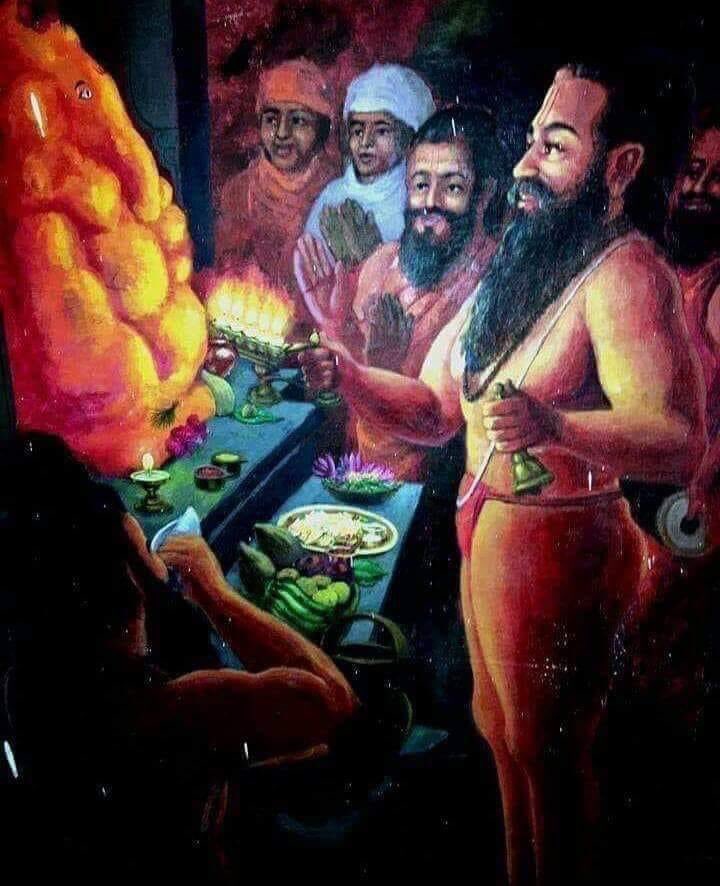
The chaffing of the YOLO type people under sobering responsibility that varNāshrama forces people to own-up has its root in one more deeper question.
kriyamāNa karma Vs prārabdha/Sanchita karma.
Or as Abrahmics like to put it - question of free-will.
kriyamāNa karma Vs prārabdha/Sanchita karma.
Or as Abrahmics like to put it - question of free-will.
https://twitter.com/Kal_Chiron/status/1287941893985247232
YOLO emphasises, prima-facie, on importance of kriyamāNa karma over Sanchita.
Which is absolutely true. KriyamāNa is the only thing we have in our hand, since Sanchita is already done and awaiting to bear fruits.
But YOLO (includes Abrahmics) tries to wipe-out Sanchita.
Which is absolutely true. KriyamāNa is the only thing we have in our hand, since Sanchita is already done and awaiting to bear fruits.
But YOLO (includes Abrahmics) tries to wipe-out Sanchita.
The argument looks very “sexy” when it hits you. The patron hero of YOLO is karNa who proudly claims :
सुतोवा सुतपुत्रोवा योवाकोवा भवाम्यहम्
दैवायत्तं कुले जन्म: मदायत्तं तु पौरुषम्
(Whether a suta or sutaputra, whoever I am. My Birth is up to fate, but my valor is up to me)
सुतोवा सुतपुत्रोवा योवाकोवा भवाम्यहम्
दैवायत्तं कुले जन्म: मदायत्तं तु पौरुषम्
(Whether a suta or sutaputra, whoever I am. My Birth is up to fate, but my valor is up to me)
We applause and cheer this for we are educated under influence of liberty-fraternity-equality values of modern education
But while karNa accepts “दैवायत्तं कुले जन्म:” part, his kriyamāNa karma doesn’t correct it. For all his life he lamented this fight against his Sanchita.
But while karNa accepts “दैवायत्तं कुले जन्म:” part, his kriyamāNa karma doesn’t correct it. For all his life he lamented this fight against his Sanchita.
Abrahmics, in the name of free-will, offer to completely wipe-out Sanchita (if one chooses to accept the messiah). An easy cop-out.
Similar to how Ashoka might have attracted to Buddha dharma (as per popular narrative of Kalinga war effect on him).
Similar to how Ashoka might have attracted to Buddha dharma (as per popular narrative of Kalinga war effect on him).
By overthrowing varNāshrama, there is a way out to overthrow Sanchita karma. As if nothing matters. Complete reset, all that is said and done in past is erased.
Now bauddha Darshana is inherently a dhārmik darshana so it does not overrule karma.
Now bauddha Darshana is inherently a dhārmik darshana so it does not overrule karma.
But this urge to “have a clean slate” is enticing nevertheless.
With varNāshrama constantly reminding one that “whatever you are is effect of your own karma” - forces one to take up responsibility of whatever that is happening to us as fruit of our own doing.
With varNāshrama constantly reminding one that “whatever you are is effect of your own karma” - forces one to take up responsibility of whatever that is happening to us as fruit of our own doing.
It is not surprising that there always was, is and will be a section who would wish to overthrow this constant reminder (like a teenager kid wanting to rebel/overthrow disciplining parents meaning good).
Samartha Rāmadāsa Svāmī beautifully explains this :
जननी-जनक माया लेकरू काय जाणे
पय न लगत मूखीं हाणितां वत्स नेणे
“What does a child know the love of parents - who like a cow pushing/disciplining her ignorant calf so that it can drink milk properly”
जननी-जनक माया लेकरू काय जाणे
पय न लगत मूखीं हाणितां वत्स नेणे
“What does a child know the love of parents - who like a cow pushing/disciplining her ignorant calf so that it can drink milk properly”
Except here, the “cow” is our own past karma, not some external God with grand plan.
The fact of the matter is - there is no escaping from Sanchita karma. It improves (and deteriorates) slowly and requires consistency in kriyamāNa karma.
And irrespective of the quality of your consistent kriyamāNa karma, you still HAVE TO face the fruits of your Sanchita.
😊
And irrespective of the quality of your consistent kriyamāNa karma, you still HAVE TO face the fruits of your Sanchita.
😊
The moment this truth seeps in deep and realisation dawns, is the moment when we attain the second of the three “shānti” that we chant after every recitation of every stotra there is.
The adhidaivika shānti :
of manas-buddhi and ahamkāra.
Of chitta.
Of antahkaraNa.
🙏🙏
The adhidaivika shānti :
of manas-buddhi and ahamkāra.
Of chitta.
Of antahkaraNa.
🙏🙏
https://twitter.com/kal_chiron/status/1326915025584463872
• • •
Missing some Tweet in this thread? You can try to
force a refresh




